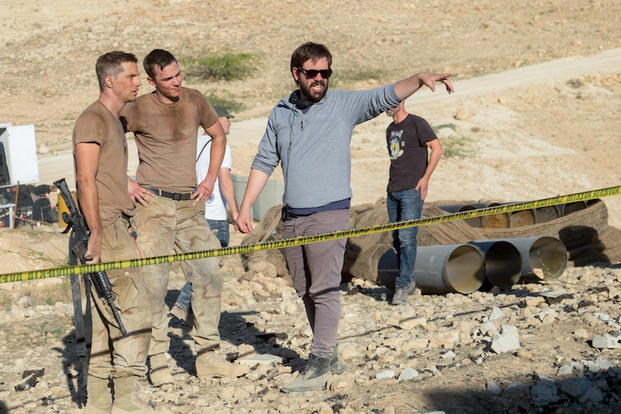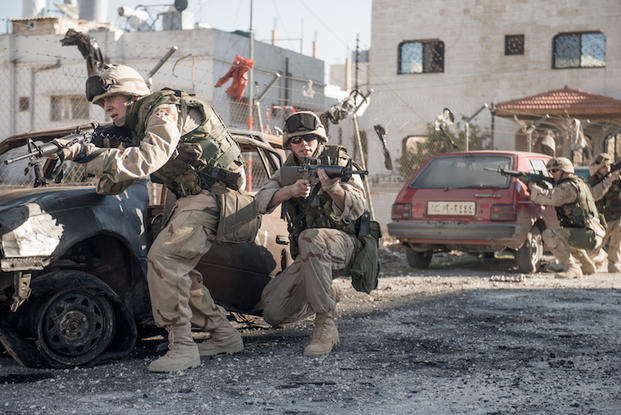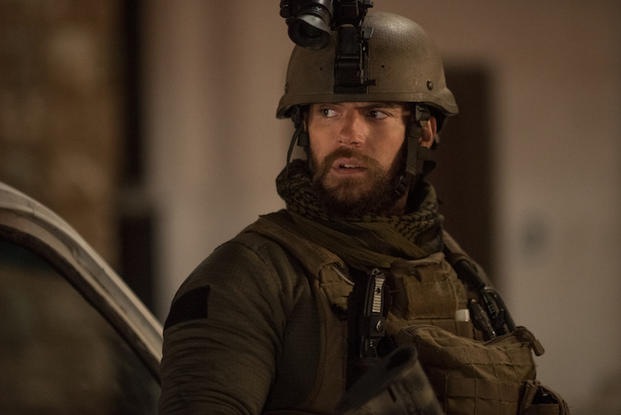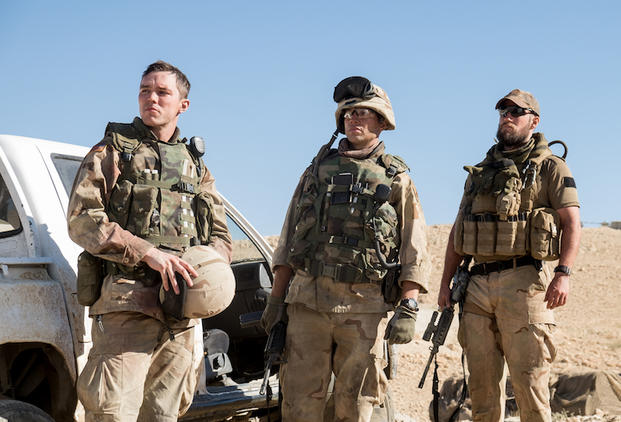Netflix has just given a worldwide streaming launch to Sand Castle, a new film about the early days of the war in Iraq. U.S. troops are ordered to the outskirts of Baqubah to repair a water pumping station damaged by U.S. bombs. Things, of course, don’t go smoothly.
Screenwriter Chris Roessner, an Army and Iraq war veteran, based the story on his own experiences in a Civil Affairs unit of the 4th Infantry division. The film features a stellar young cast that includes Nicholas Hoult (Mad Max: Fury Road, X-Men series), Logan Marshall-Green (Quarry, Prometheus), Glen Powell (Everybody Wants Some), Sam Spruell (K19: The Widowmaker, The Hurt Locker), Beau Knapp (The Nice Guys, Southpaw), Neil Brown Jr. (Straight Outta Compton) and Henry Cavill (Man of Steel, The Man from U.N.C.L.E.).
In the past, an independent film like this may with a roster of rising stars may or may not have gotten a big theatrical release. With some combination of good taste and mysterious internal metrics, Netflix decided that Sand Castle was a good fit for its audience and we all have a chance to watch it right away. Chris Roessner took the time to speak with us about his military service and how he was able to bring a story based on his time in Iraq to the screen.

Tell our readers about your military career.
I signed up July 11, 2001. And if you do the math, you realize I had pretty terrible timing. I signed up initially so I could afford college, but I learned later on that there was a deeper, richer, and more nuanced reason. My father served in the military and he was a West Point guy and a Special Forces guy, but I had never met him. In fact, I wouldn’t meet him until after I got back from the war.
On a surface level, I signed up because I wanted to pay for college. In a deeper way, I think I was trying to earn the right to have a conversation with my father. I had built this man up in my mind my whole life and I was kind of chasing him.
Ultimately. I was attached to the 4th Infantry Division. I spent a lot of time in Fort Bragg going through some special operations training with my CA unit. We deployed to Kuwait early 2003, waiting for the war to start. We crossed the border into Iraq shortly before Easter. I spent over a year there running missions all through the Sunni Triangle, as far north as Kirkuk and as far south as like Baqubah and Baghdad.
%embed1%
Were those the experiences that inspired you to write the “Sand Castle”?
It was certainly those experiences, but just as much, if not more so, I really wanted to write about the guys that I served with.
I hope that people who see this movie feel, even though it's about me in some sense, that it isn't really about me. I'm not interested in myth making. I could have written a Captain America version of myself, but I don’t care about cartoonish, faux masculinity. I care about being as honest as possible because watching a 20 or 22 year old guy sacrifice his life for somebody is about as heroic as it gets.
Even though there are some events in the movie that are lifted from real life, there's a lot of fictionalizing going on as well. Being true to the character was my top priority and I feel like in conjunction with the actors that we hit the bullseye on it.

At the beginning of the movie, it doesn’t seem like that stakes are as high as what most viewers expect from a military-themed movie, but, of course, “Sand Castle” turns out to have the same stakes and consequences that anybody who serves overseas might face.
I think that’s right. It's not a singular mission movie all the way through. It's not a take-the-hill movie or kill that bad guy or kill that sniper. It breathes a lot more. You spend a lot more time with the guys and the movie takes place over the course of their year in Iraq. And I think that matters. I think it gives the film a different feel.
How long did you serve and what happened when you got out?
I served from 2001 to 2007. I think I was just about to start grad school when my contract was up, because I signed up for the reserves initially. It was a 6 x 2 contract, meaning I served six years in the reserves and two years in active reserves. I was going to college and could have been called back up at any time, but that never happened.

As you transitioned out, how did you figure out what to do with yourself? Was it easy? Was it hard?
I was very blessed in that both my mom and my biological father served in the military. They actually met at Fort Bragg, North Carolina. So I come from a long line of military service.
When I got back home, I hadn't seen my family in two years. After I was home for three days, I said, “Something is not right, I'm not feeling right, I don’t feel ready, I don’t know what's wrong.” My family said, “Don’t worry about it, call your friends, and see if they feel the same way.”
I did and we talked about it and what I discovered was that what I was feeling is this continued desire to serve, I was looking to serve in a different way, one that wasn’t bureaucratic or felt morally muddy or had any kind of red tape.
What I did was take some of the money that I saved up from Iraq and I went to Nepal. I climbed to the base camp of Mount Everest to raise money for an orphanage. I put this whole thing together and linked up with another group of people. I was surprised at how much better I felt when I got back home. I needed a little bit of adventure and certainly Everest does that, but also I need to serve people and I needed to serve in a way that wasn’t muddy at all, if that makes sense. It was altruistic and clear. I'm going to show up, I'm going to help these orphans, and then I'm gonna come home and there will be no confusion about the good that I did.
What led you to decide to become a writer and write this screenplay?
Like a lot of people, I was sort of born a writer but didn’t know it. I think it was the war that revealed it to me. If my goal was to be a novelist or if that’s how my brain worked, I probably would have written a book about the Iraq War. But my goal was to be a filmmaker for as long as I can remember. When I returned from the war, I had all of these bits and pieces of dialogue and I had all these events that I scribbled down in my journal. I had catalogued my experience pretty thoroughly. Since my brain kind of worked in screenplays, that’s what I was going to do.
I didn’t sit down to write the screenplay until I was about 27 or 28. I was home from Iraq for seven or eight years before I even sat down to start writing. Initially, I just wanted it to be cathartic. I had no dreams whatsoever of it being made. I just wanted it to exist, so I at least knew that I tried to make some sense of this thing.
OK, you’ve finished a screenplay. How do you get the people who can make it into a movie to actually read it?
It's different for everybody. The way that it happened for me was that I was working as a low-level assistant, low man on the totem pole, for the producer Mark Gordon. He made Saving Private Ryan and he's an executive producer on this film. I finished writing the script and I gave it to my friend Sarah who was a coworker at the Mark Gordon company. She read it on Friday and liked it and gave it to a friend and then it just sort of passed around the office very quickly.
By Sunday night of that same weekend I got a call from Mark Gordon and he said, “What the hell is going on in LA? I'm getting all these phone calls about this script that you’ve written.” It sounds like a whirlwind because it was. After ten years of not getting anywhere, my life legitimately changed in a weekend.

Wasn’t “Sand Castle” on The Black List, the annual list of the best unproduced scripts in Hollywood?
I am as proud of that as anything. The screenplay was on the Black List in 2012 and that was a hell of a year to be on the list. Eric Heisserer wrote a script called Arrival that was on that list. Taylor Sheridan wrote Hell or High Water, which was on that list. Damien Chazelle wrote Whiplash, which was on that list. My film was on that list. That was a hell of a year, one of the great years of the past 20 of amazing screenplays.
Most years there are a lot of great scripts on the list that never get made. That’s a pretty high yield for one year.
That’s a very high yield for that year. Absolutely. That was a hell of a year. I've become friends with a lot of those guys on that list. We push each other each and every day to do great work. I hope that camaraderie continues. Writers and soldiers are kind of the same in that they're all in the trenches together. It's a great support group and I'm very, very lucky to be a part of it.
It seems like you helped yourself get a big break by finding a job that would put you in a position to meet the people who could recognize your talent and help your career. How did you get one of those jobs?
I went to film school and that helped me a lot just to get started. I interned for five years for free. I didn’t have any money. I got several eviction notices on my apartment. Everybody's journey is different, but if I was to give anybody advice, this is what I usually say: if you run with the fast crowd, you will run fastest even if you run last.
That has been the cornerstone of every decision I've made in my career and in my life. I'm constantly trying to find the people who are better than me, who are going to push me. I went to LA because I knew that’s where I'd find top talent. That’s been the case and I've been made a better filmmaker because of it.

The same is true when you watch Sand Castle. I would say that Matt Ocre becomes a better soldier because he's serving alongside people who are better than him. I wish I could be more specific for folks, but there is no specific way to like make this job happen. All you can do every single day is try to put yourself in a position where you're surrounded by people who are better than you. That requires you to sublimate your ego a bit, a lot in fact. It’s crucial to run with the fast crowd because you'll run faster.
How did your movie get made and end up on Netflix?
The first big win is that Mark Gordon said, “This is a good script, it's not good enough, but we're gonna make it good.” He spent two months alongside me, while I was still working for him, making it better. And we did; we made it a lot better.
When you go out looking for financing and the script is good and you have someone on it like Mark who knows what he's doing and has been doing this a long time, that makes people feel comfortable.
I initially thought that finding money would be the hardest part because who the hell is crazy enough to like write a check to make a war film independently? That wasn’t the case at all. We were very lucky to find funding and have our pick of backers. Treehouse stepped up and they financed it and you gotta give them credit for it. That’s a risky venture.
Because we made the film well, Netflix saw something there and they purchased it. Now it'll be blasted out to 90 million people and I don’t think it gets any better than that. I think that this is why you make films, so people can see them. And we're fortunate that that happened.

It’s definitely a new time for movies. Yours is a high-profile movie with stars that’s not going to theater and debuting with a streaming service.
Netflix is a great partner and they are very aggressive about this movie. Of all my friends who I graduated film school with, most of them are employed at Netflix now. They let me know that Netflix was serious about this movie and all of their actions over the past couple months have led me to believe that that’s 100 percent true, so I couldn’t be happier that they care about the movie as much as we do. I think it's going to be seen. Like I said, when I wrote it, I wasn’t expecting anything, so the fact that in one day it's gonna have the type of global reach that it'll have is heartwarming and totally unexpected and a credit to Netflix.
What's up next for you? What are you planning?
A few things, most of which I have to be a little cryptic about. I wrote a movie last year for Ben Affleck to direct, which I'm very proud of, and we'll see if that materializes. I'm really interested in writing a film about coming home from Iraq. I get a lot of movies and books submitted to me that have to do with fighting a war, but I feel like I've said what I wanted to say about that for right now. I very much want to write my coming home narrative, so I'm looking aggressively for it.




